- Home
- Dandi Daley Mackall
The Secrets of Tree Taylor Page 18
The Secrets of Tree Taylor Read online
Page 18
“We were about to come looking for you!” Dad took the food from us as we climbed into the backseat.
“Must have been crowded in the snack bar,” Mom said. “Don’t worry. You haven’t missed much. Need catching up?”
“We’re good.” I glanced at the silent Eileen. “We’ve seen enough.”
36
Be That Way
As soon as Mom’s head dropped to Dad’s shoulder and his arm snaked around her, Eileen and I escaped to Buddy’s roof. By silent agreement, we pulled one of the blankets over us. The last thing either of us wanted was to be seen.
We didn’t talk. I heard Eileen crunching popcorn. She must have heard me chomping peanuts.
We watched the movie. It didn’t take long for a Romeo and Juliet kind of love story to unfold. There were funny parts too—Officer Krupke cracked me up. He made me think of our sign-toting sheriff.
But the best part was the music. I wished Jack could have been there—he would have dug the strings and horns. Then when the dancing took off, I figured if Jack had been there, we would have danced on Buddy’s roof.
When all the characters rallied for the big finale, Eileen had to hold me down.
She climbed back inside the car before the lights came up. I tossed the blankets, then followed her.
“How did you like it?” Mom asked, once we got settled in.
“I loved it!” I answered.
“Me too,” Eileen said, without my enthusiasm.
Dad started singing the Officer Krupke song and nearly drove off with the speakers still hanging on the car. Mom stopped him just in time. Then he bullied his way into the line of cars aimed for the exit.
“Hey …” Mom craned her head around to stare out the back window. “Isn’t that Jack’s car?”
Eileen and I rolled down our windows to see better. “That’s Jack, all right,” Eileen said. “Who’s he with this time?”
Mom continued to stare. “Donna says it’s never the same girl twice.”
“That’s healthy, if you ask me,” Dad commented. “No sense getting tied down to one person at his age. Good for him.”
“But who is it?” Mom insisted. “Donna will want to know.”
“You mean there’s gossip concerning her own family that Donna doesn’t know about?” Dad pretended to be shocked.
“She says Jack has gotten so secretive. She can’t get a straight answer out of him.”
Mom and Eileen were crazy. I couldn’t see anybody except Jack. If I’d known he was here, he could have watched up on Buddy’s roof with Eileen and me.
“I see her now,” Mom said. “It’s Maggie Potts’s girl.”
I looked again. The girl slid a few inches away from Jack. She’d been sitting so close to him that I hadn’t seen her. “Suzi.” Suzi from the reservoir dance.
“That’s who I thought it was.” Eileen leaned back in the seat. “Suzi Potts was homecoming queen last year.”
I couldn’t have said why, but seeing Jack, or seeing Jack with Suzi, or whatever, poured cold water on the musical high I’d been feeling.
I could tell Eileen was searching for Butch’s car as we left. Thankfully, we didn’t see it.
On the drive home, Mom and Dad babbled on about the movie and the previews. Mom claimed the only way she’d see any Alfred Hitchcock movie was with earplugs and a blindfold.
When we turned off the highway to drive into Hamilton, everybody stopped talking. Hamilton was asleep. We crept up Main Street and crossed the railroad tracks with a thump, thump.
“Not again,” Mom said. “That poor man.” Then she laughed.
Dad laughed too. “You’d think the guy would learn.”
“What?” Eileen asked before I could. Then she cracked up too.
Finally, I saw why. In the center of Main Street, on a Mickey Mouse beach towel, sat Officer Duper’s official parking sign.
“Now that’s funny,” I said.
Then just like that, we stopped laughing. A dry silence filled our car. I wondered if Mom and Dad and Eileen were thinking what I was thinking. All the problems that had been facing us before we escaped to the drive-in were still waiting for us. And what if those problems were just previews of worse things about to play out in our lives?
The second we walked into the house, the phone rang.
“I’ll take that blindfold and earplugs now, please,” Mom said, without her original humor.
We might have taken the stupid phone off the hook if we’d been a normal family. But Dad had to be available for certain patients. He gave a secret ring code to pregnant women and really sick patients so they could reach him in the middle of the night—ring once, hang up, call again. Or ring three times, then two. That way, we didn’t always have to answer the regular rings at night.
The phone rang and rang as the four of us stood in the dark kitchen and listened to it.
“Let’s have some ice cream before bed,” Dad suggested, turning on the lights.
I glanced at Mom, expecting her to tell Dad he was crazy. Ice cream at this hour? After what we’d eaten at the drive-in? I waited for Eileen to say she couldn’t afford the calories.
Mom turned toward the fridge. “Hot fudge?”
Eileen was right on Mom’s heels. “Whipped cream!”
“Cool!” I grabbed the jar of cherries and followed Dad into the backyard. Branches of our tamarack tree caught my arm when I tried to slip out. Dad wouldn’t trim that tree for anything. As far as I knew, Mom had never asked him to. As for me, I would have cried at the loss of a single branch, though I couldn’t have said why.
Mom and Eileen bumped the door for help. Dad opened it, and I reached for sundaes, while Eileen and Mom shimmied outside.
We plopped down on the grass, ignoring chiggers and bugs and whatever mysteries lurked in our backyard. Midge took turns begging for handouts before settling onto my lap.
“There’s the Big Dipper,” Eileen said.
“And the Little Dipper.” Mom pointed, but she didn’t need to. Both dippers shone like they were sending us secret, urgent messages from the heavens.
“You can see Boötes the Herdsman and his faithful hounds. Look! There’s his shepherd’s crook!” Dad sounded as proud as if he’d shot that constellation into the sky himself.
For a second, I wondered if people in Vietnam could see the same sky we were seeing. The same Big and Little Dipper. The same Herdsman. And what if a Vietnamese girl happened to be looking up at the sky at that very moment, wondering if an American girl was gazing up and seeing the same sky as hers?
I breathed in the night and wished the ice cream would stop melting.
And the phone would stop ringing.
But then I thought: Let it ring.
We are the kind of family that sees shapes in stars. We write when we have to, when we want to and need to. We go to drive-ins together and eat hot fudge sundaes after midnight. And we are a family that won’t trim a tamarack tree, even though it means we have to duck to get out to the backyard.
37
Creeps
For the second Sunday in a row, the Taylors and the Adamses did not make music together. I didn’t know how much more I could take.
The anonymous notes kept coming. I even found one in Midge’s doghouse.
Most of the basic material a writer works with is acquired before the age of fifteen.—Willa Cather
Great.
I hadn’t forgotten my promise to write about the Kinneys for the Hamiltonian. I sure didn’t want to disappoint Randy. And I really did want to know what happened—maybe more than ever. I just couldn’t figure out how to ask Mrs. Kinney about it without wrecking the little bit of trust she seemed to have in me.
Jack stopped by the pool on Wednesday and we talked. Right away, he picked up on my blue funk. “Tree, you gotta snap out of it. Breaking our Sunday night tradition is a drag. But never fear! I’ll get Donna and Bob to your pad next Sunday or my name’s not Jack.”
In spite of everything, I
believed him.
Penny had come by the pool almost every day since Gary’s birthday. She and I got to talking more and more. It was Sarah who kept us going. She’d cover for me and give me the nudge to go say hey to Penny. I knew my best friend was already looking out for me, trying to make my future Sarah-free school days less miserable.
Thursday, two weeks before the steam engine show and the Fourth of July, I skipped supper and went out to sit with Penny. I’d been checking in on her progress with To Kill a Mockingbird. She’d be reading, her back against the fence, and I’d stroll up, clearing my throat so I wouldn’t startle her. But she’d be startled anyways and stare up like she was totally surprised to find me at the pool, and maybe to find herself there too.
Penny looked different than she did in school, prettier, with freckles across a cute little nose. Sarah said Penny looked prettier because I was getting to know her better.
“Still liking the book?” I plopped beside her on her towel.
“I’m loving it, Tree. Can’t decide if I like Scout or Atticus more, but I think Atticus. You know, the trial and injustice—this book could have come straight from the newspapers.”
She went on for five minutes about what was happening in the nation with black people getting their civil rights. She knew all about Martin Luther King, Jr., and Freedom Rides. “In Birmingham, they arrested Dr. King for nothing, Tree! He didn’t do anything wrong.”
“I know. Dad wrote a letter. To our senators, I think. Maybe to the president.”
“Good for him! I wish I could go on one of those freedom marches. Don’t you?” She turned to me, waiting for an answer.
I’d seen reports of the marches on TV. They usually ended with white policemen turning fire hoses or clubs on the marchers. “Yeah. Kind of.”
Penny kept going. “Did you know that in Kansas City, black children still aren’t allowed to swim in the municipal pools? They have to go to their own pools. And you can bet theirs aren’t half as nice as the pools for whites. It’s not right. And it’s going to change. You’ll see. It’s already changing.”
“I believe you, Penny. You know a heck of a lot more about it than I do.”
“Would you let a black person swim in this pool?”
“Sure. I mean, if it were my pool. I don’t really know what the rules are.” I felt like she was accusing me. And maybe I was accusing myself a little because I’d never thought about it before. “I don’t think we’ve ever had a black person ask to swim.”
“Sorry,” she said. “I get carried away.”
“That’s a good thing, Pen. Jack says we should all get carried away more, especially about things happening to other people and not just us.” I was remembering the note I’d found tied to our tamarack the day before. The paper dripped with morning dew, but I could still read the words:
Everybody in the world ought to be sorry for everybody else.
It was from something called The Halo, by Bettina Von Hutten.
“Jack’s right,” Penny said, and she went on to talk about segregation in public schools and how claims of equal education were a joke.
I had to wonder who else she got to talk to about this stuff. Karen never seemed to talk to Penny about anything, at least not when I saw them together. And all Chuck did was bark orders at her and call her names. Sarah and I had decided Penny came to the pool to get away from home. We’d only seen her in the water a couple of times, and she wouldn’t be taking home any swimming medals.
“Getting back to Mockingbird,” Penny said, closing the book but keeping her finger in her spot, “I love it when Atticus tells Scout, ‘You never really understand a person until you consider things from his point of view—until you climb into his skin and walk around in it.’ You know, Atticus reminds me of your father.”
“No lie?” Dad got called out to the Atkinson house for Penny’s mother now and then. I thought she got bad headaches. I’d ridden along on some of the house calls, but Dad made me wait in the car.
Penny kept talking, but I couldn’t concentrate. Wanda and her flock of admirers, male and female, were lying out on the other side of the pool. I couldn’t stop sneaking peeks at them, especially when they exploded into laughter or got into shouting matches.
“… like that time your dad ran over Rolfe.”
That brought me back on full alert. “Rolfe? My dad ran over a Rolfe?”
“Our dog?”
“Not that giant long-haired dog? The one with so much hair in his face, you can’t see his eyes?” I’d seen that dog in their yard when I tagged along on calls. Sometimes the mutt pounced on the car door and scratched to get in.
“I think you’re talking about Rolfe the Second. This was last year, with Rolfe the First. But his hair was in his eyes too. Maybe that’s why he ran in front of your dad’s car.”
“Penny, I didn’t know anything about it! Why didn’t you—or Dad—say something?” But I knew why my dad wouldn’t have said anything. For the same reason he tried to get birds out of the car grill before Eileen and I could see they’d been smashed there. For the same reason I couldn’t talk to him about the Kinneys. For the same stupid reason I already knew I wouldn’t be asking him about Rolfe or letting him know I knew.
Secrets.
“I didn’t say anything to you at school because I figured you already knew,” Penny explained. “And anyway, I felt weird. It wasn’t your dad’s fault at all, and he felt so bad about it, Tree. Anybody else, except maybe Atticus, would have kept on driving and not looked back. But not your dad. You should have seen him carrying that dog up to the house in his arms.
“He worked on Rolfe for an hour before he died. Your dad cried when he told us Rolfe was gone. He buried him that night—dug the hole himself. Mom and Karen and I kept telling him that Rolfe ran out in front of cars all the time, no matter what we did to get him to stop. The dog was dumb as dirt. It happened late at night—I think your dad had been seeing somebody at Cameron Hospital. He wasn’t driving fast. Rolfe just shot out of nowhere.”
“I don’t know what to say. I’m … I’m sorry.” I thought about Midge. Lately, I hadn’t been paying enough attention to her. I didn’t know what I’d do if Midge ever got run over.
“Ed, my stepfather, came home the next day. All he could talk about was trying to get money out of your dad. Mom had to talk him out of suing. It was nuts. Ed hates dogs, especially Rolfe.” She shook her head, and her whole face changed.
“Two days later your dad walked up to our house with Rolfe the Second. I don’t know where he found a dog that looked so much like Rolfe the First. I do know that he must have gone to Kansas City for him. This Rolfe isn’t a mutt like the other one. He’s smart and a purebred. That was pretty classy of your dad. He didn’t have to do that.”
And I’d had zero idea anything was going on.
Chuck strolled up to us. Penny’s back was to him.
“There’s your brother, Penny.”
Penny’s body stiffened. “He’s not my brother, Tree.”
“Hey, gals! What’s happening?” Chuck stopped beside our towel. He towered over us, blocking out the sun. He was wearing shades, so I couldn’t see his eyes. “So, basketgirl, shouldn’t you get back to work in your basket room?” He reached down and took my arm, like he was about to pull me to my feet.
Penny shot up off her towel like a missile from a launch-pad. “Get away from her!”
Two seventh graders sunning a few feet from us turned around.
“Penny?” I looked from her to Chuck and back. “It’s okay.” Chuck had already moved his hand away.
“No!” Penny screamed. “It’s not okay.”
Chuck held up his arms, palms toward us. “Touchy, aren’t we, Penelope?” He backed away, chuckling to himself.
Penny snatched up her towel and headed for the locker room.
Sarah walked up behind me. “That Chuck guy is really starting to creep me out.”
38
Blows My Mind
&n
bsp; On Saturday I pulled out my bike and discovered I had a flat. Great. I’d probably be late for work.
I set out on foot. As I got close to the pool, I heard shouts and laughter. A crowd had gathered along the wire fence. Kids pointed. Adults howled. I pushed through them to see what was so funny.
There, in the deepest part of the pool, was Officer Duper’s sign: FOR POLICE DEPARTMENT VEHICLES ONLY, BY ORDER OF OFFICER DUPER.
Ray came up behind me. “Isn’t that too cool!” He put his hands on my shoulders, and I felt it all the way down to my toes.
Wayne shuffled up beside Ray. “I guess this was the final straw. Officer Duper is no more. He quit this morning.”
“Perfect timing!” Ray cracked up, removing his hands from my shoulders. “Sheriff Robinson got back with a string of bass today. Looks like he’ll be staying on another fifty years.”
Nobody around us was complaining. In his brief term as sheriff, Officer Duper had given out more tickets than Sheriff Robinson had in fifty years. I felt pretty sure that everybody in town knew they had Jack to thank for the send-off, even though nobody ever said so, including Jack.
Penny showed up at the basket counter in the afternoon, acting as if she hadn’t left in such a weird way last time.
I played along. I didn’t want to set her off again. I took her basket without looking at her. “So, did you finish the book yet?”
“Stayed up all night. No wonder it’s your favorite book, Tree. Mine too now. I’m starting my first Agatha Christie mystery. Got it from the library this morning.” She pulled the book from her basket. “The Murder of Roger—”
“Ackroyd!” I finished for her.
“Heard of it?”
“I’m rereading it right now.”
“Maybe we can talk about this one too, then.”
“And I promise not to give away the ending. I think it’s her best.”
Someone behind Penny cleared her throat on purpose. Wanda.
“See you later,” Penny said, heading for her reading spot.
Wanda, clad in her bikini, set her basket onto the counter but didn’t let go. “So, how are you, Tree?”

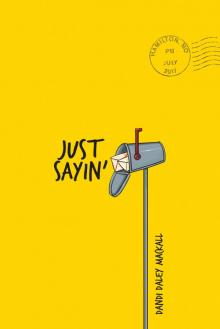 Just Sayin'
Just Sayin' Eager Star
Eager Star Gift Horse
Gift Horse Cowboy Colt
Cowboy Colt Natalie and the Bestest Friend Race
Natalie and the Bestest Friend Race Buckskin Bandit
Buckskin Bandit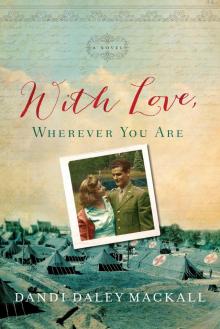 With Love, Wherever You Are
With Love, Wherever You Are Runaway
Runaway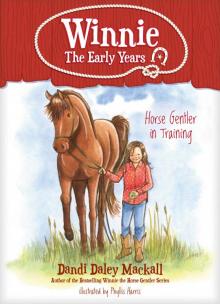 Horse Gentler in Training
Horse Gentler in Training Crazy in Love
Crazy in Love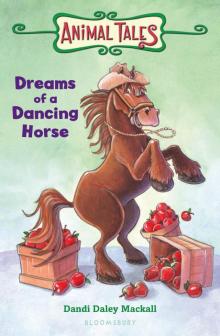 Dreams of a Dancing Horse
Dreams of a Dancing Horse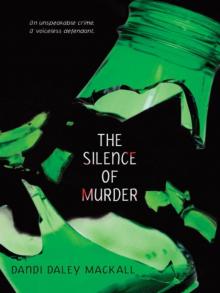 The Silence of Murder
The Silence of Murder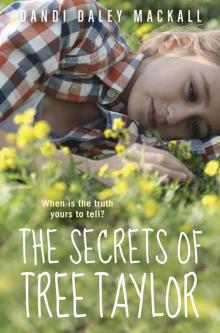 The Secrets of Tree Taylor
The Secrets of Tree Taylor Night Mare
Night Mare Natalie Wants a Puppy
Natalie Wants a Puppy Bold Beauty
Bold Beauty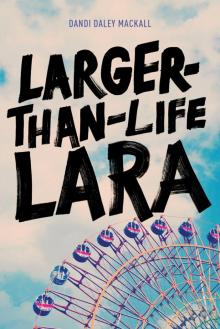 Larger-Than-Life Lara
Larger-Than-Life Lara My Boyfriends' Dogs
My Boyfriends' Dogs Dark Horse
Dark Horse Horse Dreams
Horse Dreams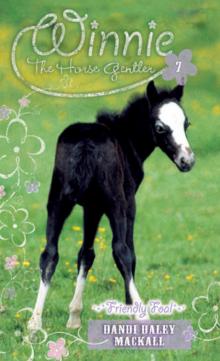 Friendly Foal
Friendly Foal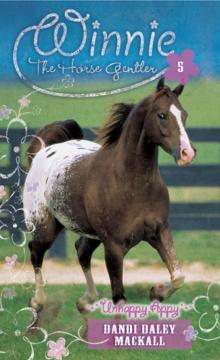 Unhappy Appy
Unhappy Appy Mad Dog
Mad Dog A Horse's Best Friend
A Horse's Best Friend